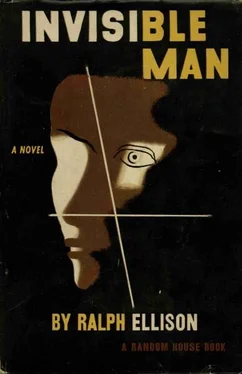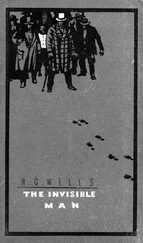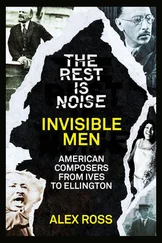Ralph Ellison - Invisible man
Здесь есть возможность читать онлайн «Ralph Ellison - Invisible man» весь текст электронной книги совершенно бесплатно (целиком полную версию без сокращений). В некоторых случаях можно слушать аудио, скачать через торрент в формате fb2 и присутствует краткое содержание. Год выпуска: 1995, ISBN: 1995, Издательство: Vintage Books, Жанр: Классическая проза, на английском языке. Описание произведения, (предисловие) а так же отзывы посетителей доступны на портале библиотеки ЛибКат.
- Название:Invisible man
- Автор:
- Издательство:Vintage Books
- Жанр:
- Год:1995
- ISBN:9780679732761
- Рейтинг книги:4 / 5. Голосов: 1
-
Избранное:Добавить в избранное
- Отзывы:
-
Ваша оценка:
- 80
- 1
- 2
- 3
- 4
- 5
Invisible man: краткое содержание, описание и аннотация
Предлагаем к чтению аннотацию, описание, краткое содержание или предисловие (зависит от того, что написал сам автор книги «Invisible man»). Если вы не нашли необходимую информацию о книге — напишите в комментариях, мы постараемся отыскать её.
The Waste Land,
Invisible man — читать онлайн бесплатно полную книгу (весь текст) целиком
Ниже представлен текст книги, разбитый по страницам. Система сохранения места последней прочитанной страницы, позволяет с удобством читать онлайн бесплатно книгу «Invisible man», без необходимости каждый раз заново искать на чём Вы остановились. Поставьте закладку, и сможете в любой момент перейти на страницу, на которой закончили чтение.
Интервал:
Закладка:
Left alone, I lay fretting over my identity. I suspected that I was really playing a game with myself and that they were taking part. A kind of combat. Actually they knew as well as I, and I for some reason preferred not to face it. It was irritating, and it made me feel sly and alert. I would solve the mystery the next instant. I imagined myself whirling about in my mind like an old man attempting to catch a small boy in some mischief, thinking, Who am I? It was no good. I felt like a clown. Nor was I up to being both criminal and detective -- though why criminal I didn't know.
I fell to plotting ways of short-circuiting the machine. Perhaps if I shifted my body about so that the two nodes would come together -- No, not only was there no room but it might electrocute me. I shuddered. Whoever else I was, I was no Samson. I had no desire to destroy myself even if it destroyed the machine; I wanted freedom, not destruction. It was exhausting, for no matter what the scheme I conceived, there was one constant flaw -- myself. There was no getting around it. I could no more escape than I could think of my identity. Perhaps, I thought, the two things are involved with each other. When I discover who I am, I'll be free.
It was as though my thoughts of escape had alerted them. I looked up to see two agitated physicians and a nurse, and thought, It's too late now, and lay in a veil of sweat watching them manipulate the controls. I was braced for the usual shock, but nothing happened. Instead I saw their hands at the lid, loosening the bolts, and before I could react they had opened the lid and pulled me erect.
"What's happened?" I began, seeing the nurse pause to look at me.
"Well?" she said.
My mouth worked soundlessly.
"Come on, get it out," she said.
"What hospital is this?" I said.
"It's the factory hospital," she said. "Now be quiet."
They were around me now, inspecting my body, and I watched with growing bewilderment, thinking, what is a factory hospital?
I felt a tug at my belly and looked down to see one of the physicians pull the cord which was attached to the stomach node, jerking me forward.
"What is this?" I said.
"Get the shears," he said.
"Sure," the other said. "Let's not waste time."
I recoiled inwardly as though the cord were part of me. Then they had it free and the nurse clipped through the belly band and removed the heavy node. I opened my mouth to speak but one of the physicians shook his head. They worked swiftly. The nodes off, the nurse went over me with rubbing alcohol. Then I was told to climb out of the case. I looked from face to face, overcome with indecision. For now that it appeared that I was being freed, I dared not believe it. What if they were transferring me to some even more painful machine? I sat there, refusing to move. Should I struggle against them?
"Take his arm," one of them said.
"I can do it," I said, climbing fearfully out.
I was told to stand while they went over my body with the stethoscope.
"How's the articulation?" the one with the chart said as the other examined my shoulder.
"Perfect," he said.
I could feel a tightness there but no pain.
"I'd say he's surprisingly strong, considering," the other said.
"Shall we call in Drexel? It seems rather unusual for him to be so strong."
"No, just note it on the chart."
"All right, nurse, give him his clothes."
"What are you going to do with me?" I said. She handed me clean underclothing and a pair of white overalls.
"No questions," she said. "Just dress as quickly as possible."
The air outside the machine seemed extremenly rare. When I bent over to tie my shoes I thought I would faint, but fought it off. I stood shakily and they looked me up and down.
"Well, boy, it looks as though you're cured," one of them said. "You're a new man. You came through fine. Come with us," he said.
We went slowly out of the room and down a long white corridor into an elevator, then swiftly down three floors to a reception room with rows of chairs. At the front were a number of private offices with frosted glass doors and walls.
"Sit down there," they said. "The director will see you shortly."
I sat, seeing them disappear inside one of the offices for a second and emerge, passing me without a word. I trembled like a leaf. Were they really freeing me? My head spun. I looked at my white overalls. The nurse said that this was the factory hospital ... Why couldn't I remember what kind of factory it was? And why a factory hospital? Yes ... I did remember some vague factory; perhaps I was being sent back there. Yes, and he'd spoken of the director instead of the head doctor; could they be one and the same? Perhaps I was in the factory already. I listened but could hear no machinery.
ACROSS the room a newspaper lay on a chair, but I was too concerned to get it. Somewhere a fan droned. Then one of the doors with frosted glass was opened and I saw a tall austere-looking man in a white coat, beckoning to me with a chart.
"Come," he said.
I got up and went past him into a large simply furnished office, thinking, Now, I'll know. Now.
"Sit down," he said.
I eased myself into the chair beside his desk. He watched me with a calm, scientific gaze.
"What is your name? Oh here, I have it," he said, studying the chart. And it was as though someone inside of me tried to tell him to be silent, but already he had called my name and I heard myself say, "Oh!" as a pain stabbed through my head and I shot to my feet and looked wildly around me and sat down and got up and down again very fast, remembering. I don't know why I did it, but suddenly I saw him looking at me intently, and I stayed down this time.
He began asking questions and I could hear myself replying fluently, though inside I was reeling with swiftly changing emotional images that shrilled and chattered, like a sound-track reversed at high speed.
"Well, my boy," he said, "you're cured. We are going to release you. How does that strike you?"
Suddenly I didn't know. I noticed a company calendar beside a stethoscope and a miniature silver paint brush. Did he mean from the hospital or from the job? ...
"Sir?" I said.
"I said, how does that strike you?"
"All right, sir," I said in an unreal voice. "I'll be glad to get back to work."
He looked at the chart, frowning. "You'll be released, but I'm afraid that you'll be disappointed about the work," he said.
"What do you mean, sir?"
"You've been through a severe experience," he said. "You aren't ready for the rigors of industry. Now I want you to rest, undertake a period of convalescence. You need to become readjusted and get your strength back."
"But, sir --"
"You mustn't try to go too fast. You're glad to be released, are you not?"
"Oh, yes. But how shall I live?"
"Live?" his eyebrows raised and lowered. "Take another job," he said. "Something easier, quieter. Something for which you're better prepared."
"Prepared?" I looked at him, thinking, Is he in on it too? "I'll take anything, sir," I said.
"That isn't the problem, my boy. You just aren't prepared for work under our industrial conditions. Later, perhaps, but not now. And remember, you'll be adequately compensated for your experience."
"Compensated, sir?"
"Oh, yes," he said. "We follow a policy of enlightened humanitarianism; all our employees are automatically insured. You have only to sign a few papers."
"What kind of papers, sir?"
"We require an affidavit releasing the company of responsibility," he said. "Yours was a difficult case, and a number of specialists had to be called in. But, after all, any new occupation has its hazards. They are part of growing up, of becoming adjusted, as it were. One takes a chance and while some are prepared, others are not."
Читать дальшеИнтервал:
Закладка:
Похожие книги на «Invisible man»
Представляем Вашему вниманию похожие книги на «Invisible man» списком для выбора. Мы отобрали схожую по названию и смыслу литературу в надежде предоставить читателям больше вариантов отыскать новые, интересные, ещё непрочитанные произведения.
Обсуждение, отзывы о книге «Invisible man» и просто собственные мнения читателей. Оставьте ваши комментарии, напишите, что Вы думаете о произведении, его смысле или главных героях. Укажите что конкретно понравилось, а что нет, и почему Вы так считаете.











